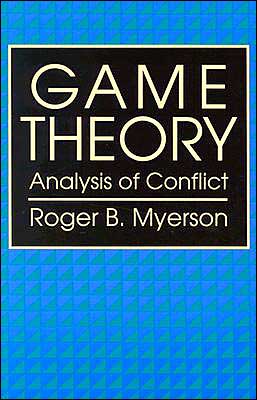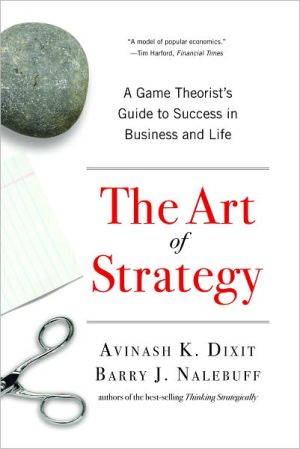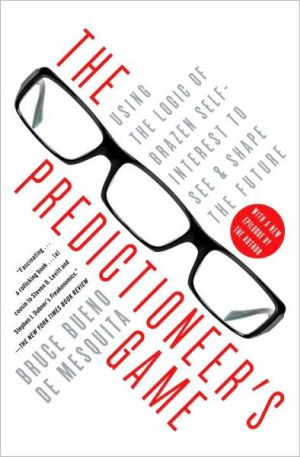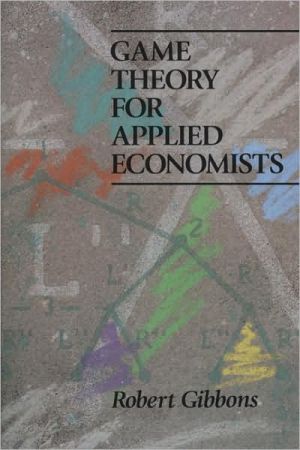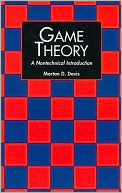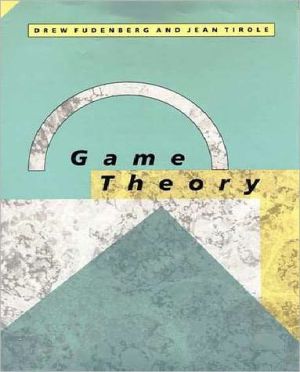Game Theory: Analysis of Conflict
Eminently suited to classroom use as well as individual study, Roger Myerson's introductory text provides a clear and thorough examination of the models, solution concepts, results, and methodological principles of noncooperative and cooperative game theory. Myerson introduces, clarifies, and synthesizes the extraordinary advances made in the subject over the past fifteen years, presents an overview of decision theory, and comprehensively reviews the development of the fundamental models:...
Search in google:
Eminently suited to classroom use as well as individual study, Roger Myerson's introductory text provides a clear and thorough examination of the models, solution concepts, results, and methodological principles of noncooperative and cooperative game theory. Myerson introduces, clarifies, and synthesizes the extraordinary advances made in the subject over the past fifteen years, presents an overview of decision theory, and comprehensively reviews the development of the fundamental models: games in extensive form and strategic form, and Bayesian games with incomplete information.Game Theory will be useful for students at the graduate level in economics, political science, operations research, and applied mathematics. Everyone who uses game theory in research will find this book essential. Ehud Kalai - Games and Economic Behavior In a clear, Myersonian writing style, this book systematically describes our state-of-the-art knowledge of game theory. Written as an introductory text, it looks at the subject from the viewpoint of a newcomer to the field, beginning with utility theory and arriving at the most sophisticated ideas discussed today. Myerson not only gives complete mathematical statements and proofs, but also supplies the intuitive arguments that motivate them...Because of its comprehensiveness, researchers and users of game theory can find descriptions of almost all special game theoretic topics and issues presented in "user friendly" style...It is very likely that Myerson's Game Theory will remain the main introductory text for many years to come.
Preface1. Decision-Theoretic Foundations1.1 Game Theory, Rationality, and Intelligence1.2 Basic Concepts of Decision Theory 1.3 Axioms 1.4 The Expected-Utility Maximization Theorem 1.5 Equivalent Representations1.6 Bayesian Conditional-Probability Systems1.7 Limitations of the Bayesian Model1.8 Domination1.9 Proofs of the Domination TheoremsExercises2. Basic Models2.1 Games in Extensive Form2.2 Strategic Form and the Normal Representation2.3 Equivalence of Strategic-Form Games2.4 Reduced Normal Representations2.5 Elimination of Dominated Strategies2.6 Multiagent Representations2.7 Common Knowledge2.8 Bayesian Games2.9 Modeling Games with Incomplete InformationExercises3. Equilibria of Strategic-Form Games3.1 Domination and Ratonalizability3.2 Nash Equilibrium3.3 Computing Nash Equilibria3.4 Significance of Nash Equilibria3.5 The Focal-Point Effect3.6 The Decision-Analytic Approach to Games3.7 Evolution. Resistance. and Risk Dominance3.8 Two-Person Zero-Sum Games3.9 Bayesian Equilibria3.10 Purification of Randomized Strategies in Equilibria3.11 Auctions3.12 Proof of Existence of Equilibrium3.13 Infinite Strategy SetsExercises4. Sequential Equilibria of Extensive-Form Games4.1 Mixed Strategies and Behavioral Strategies4.2 Equilibria in Behavioral Strategies4.3 Sequential Rationality at Information States with Positive Probability4.4 Consistent Beliefs and Sequential Rationality at All Information States4.5 Computing Sequential Equilibria4.6 Subgame-Perfect Equilibria4.7 Games with Perfect Information4.8 Adding Chance Events with Small Probability4.9 Forward Induction4.10 Voting and Binary Agendas4.11 Technical ProofsExercises 5. Refinements of Equilibrium in Strategic Form5.1 Introduction5.2 Perfect Equilibria5.3 Existence of Perfect and Sequential Equilibria5.4 Proper Equilibria5.5 Persistent Equilibria5.6 Stable Sets 01 Equilibria5.7 Generic Properties5.8 ConclusionsExercises6. Games with Communication6.1 Contracts and Correlated Strategies6.2 Correlated Equilibria6.3 Bayesian Games with Communication6.4 Bayesian Collective-Choice Problems and Bayesian Bargaining Problems 6.5 Trading Problems with Linear Utility6.6 General Participation Constraints for Bayesian Games with Contracts6.7 Sender-Receiver Games6.8 Acceptable and Predominant Correlated Equilibria6.9 Communication in Extensive-Form and Multistage GamesExercisesBibliographic Note7. Repeated Games7.1 The Repeated Prisoners Dilemma7.2 A General Model of Repeated Garnet7.3 Stationary Equilibria of Repeated Games with Complete State Information and Discounting7.4 Repeated Games with Standard Information: Examples7.5 General Feasibility Theorems for Standard Repeated Games7.6 Finitely Repeated Games and the Role of Initial Doubt7.7 Imperfect Observability of Moves7.8 Repeated Wines in Large Decentralized Groups7.9 Repeated Games with Incomplete Information7.10 Continuous Time7.11 Evolutionary Simulation of Repeated GamesExercises 8. Bargaining and Cooperation in Two-Person Games8.1 Noncooperative Foundations of Cooperative Game Theory8.2 Two-Person Bargaining Problems and the Nash Bargaining Solution8.3 Interpersonal Comparisons of Weighted Utility8.4 Transferable Utility8.5 Rational Threats8.6 Other Bargaining Solutions8.7 An Alternating-Offer Bargaining Game8.8 An Alternating-Offer Game with Incomplete Information8.9 A Discrete Alternating-Offer Game8.10 RenegotiationExercises9. Coalitions in Cooperative Games9.1 Introduction to Coalitional Analysis9.2 Characteristic Functions with Transferable Utility9.3 The Core9.4 The Shapkey Value9.5 Values with Cooperation Structures9.6 Other Solution Concepts9.7 Colational Games with Nontransferable Utility9.8 Cores without Transferable Utility9.9 Values without Transferable UtilityExercisesBibliographic Note10. Cooperation under Uncertainty10.1 Introduction10.2 Concepts of Efficiency10.3 An Example10.4 Ex Post Inefficiency and Subsequent Oilers10.5 Computing Incentive-Efficient Mechanisms10.6 Inscrutability and Durability10.7 Mechanism Selection by an Informed Principal10.8 Neutral Bargaining Solutions10.9 Dynamic Matching Processes with Incomplete InformationExercisesBibliographyIndex
\ Games and Economic BehaviorIn a clear, Myersonian writing style, this book systematically describes our state-of-the-art knowledge of game theory. Written as an introductory text, it looks at the subject from the viewpoint of a newcomer to the field, beginning with utility theory and arriving at the most sophisticated ideas discussed today. Myerson not only gives complete mathematical statements and proofs, but also supplies the intuitive arguments that motivate them...Because of its comprehensiveness, researchers and users of game theory can find descriptions of almost all special game theoretic topics and issues presented in "user friendly" style...It is very likely that Myerson's Game Theory will remain the main introductory text for many years to come.\ — Ehud Kalai\ \ \ \ \ \ Mathematical ReviewsExposing an applied mathematics field on a basic level poses a challenge to an author, namely, to find the proper mix of displaying the models, providing the motivation and presenting the mathematical results and derivations. This is even more true in a field like game theory, where the models are not universally acceptable as adequately depicting real applications. The author, in the text under review, is doing remarkably well. The models are displayed with enough details and explanations to generate motivation even in newcomers to the field...All in all, it is a very good elaborate introduction to game theory.\ — Zvi Artstein\ \ \ \ ChoiceMyerson provides a good introduction to game theory, focusing on the 'generality and unity of game theory' rather than on its extensive applications. After a brief overview of Bayesian decision theory, noncooperative and cooperative models of games are explored in the context of their solutions, results, and guiding methodological principles. The relative merits of the extensive form and the strategic form of a game are illustrated, which lead naturally into an analysis of equilibria for each representation. Special extensions are discussed, including games with communication, repeated games, and noncooperative games that introduce the elements of bargaining and coalitions...The book has interesting and challenging problem sets for each chapter as well as a bibliography for students who want to study in more depth specific topics in game theory.\ \ \ \ \ \ American Mathematical MonthlyA very well-written introduction to game theory.\ \ \ \ \ \ BooknewsCloth edition $49.95. A general introduction to game theory, intended for both classroom use and self-study, conveying both the generality of scope and the unity of game theory, and presenting some of the most important models, solution concepts, and results, as well as the methodological principles that have guided game theorists to develop these models and solutions. Annotation c. Book News, Inc., Portland, OR (booknews.com)\ \
